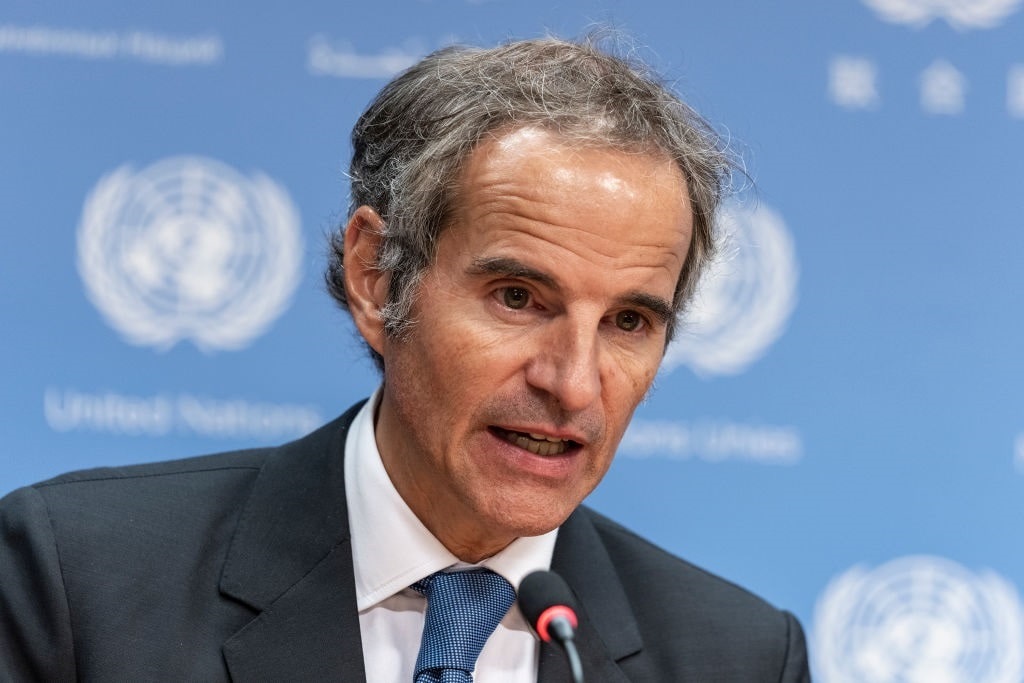The UN International Atomic Energy Agency (IAEA) Director General Rafael Grossi traveled to Iran to attend the International Conference on Nuclear Science and Technology 2024 on May 6-8 in Isfahan, Iran. Platitudes, no doubt, will abound, but little substantive progress will be made. According to IAEA, during his trip to Isfahan, Grossi wants to discuss nuclear issues and get Iran to agree to more stringent controls over its nuclear weapons program.
Grossi’s visit to Iran last year had similar expectations with equally predictable disappointment. Liberty Nation’s report in April — “Is Iran Closing In on Nuclear Weapons?” — explained that the country has been diligently pursuing the refinement of nuclear material to achieve weapons-grade uranium U-235. “There are reasons for concern regarding Iran’s desire for nuclear weapons – a priority for Tehran. Iran is working hard to develop nuclear weapons, and the flawed 2015 nuclear agreement by the Obama administration did not deter Iran from its path – nor could it have,” LN observed.
Aspirations for Iran Meetings Likely to Be Unrealized
The IAEA director general’s goals for this meeting with the Iranians are no more likely to be successful than in previous ones. Reuters agreed that “analysts and diplomats say [Grossi] has limited leverage and must be wary of empty promises.” He was pessimistic in his report to the 35-member IAEA Board of Governors in March. In an understatement, he told the board there were unresolved issues with Iran, but he wants to continue this dialogue because his report indicated they are not in the place he “would like us to be.”
 This week’s talks are strained, as they take place against a backdrop of growing tensions in the Middle East, the genesis of which can be put at Iran’s doorstep. The country recently launched more than 300 cruise missiles, drones, and ballistic missiles at Israel, with only 1% getting through the Israeli, US, UK, and Jordanian air defenses, resulting in no damage. Plus, Israel’s counterstrike, with one missile destroying an Iranian anti-aircraft installation, does not help negotiating efforts.
This week’s talks are strained, as they take place against a backdrop of growing tensions in the Middle East, the genesis of which can be put at Iran’s doorstep. The country recently launched more than 300 cruise missiles, drones, and ballistic missiles at Israel, with only 1% getting through the Israeli, US, UK, and Jordanian air defenses, resulting in no damage. Plus, Israel’s counterstrike, with one missile destroying an Iranian anti-aircraft installation, does not help negotiating efforts.
Grossi had proposed an agreement for “Interactions between the IAEA and Iran” to be carried out in a “spirit of collaboration” based on the “comprehensive safeguards agreement.” His statement explained that Iran “expressed its readiness to continue cooperation and provide further information” regarding nuclear development sites and outstanding “safeguards.” Last, Iran and the IAEA agreed that Tehran would volunteer to “allow the IAEA to implement further appropriate verification and monitoring activities.” The director general is revisiting the joint statement during the current meetings because no progress has been made.
Tehran With a Nuclear Weapon Portends Dire Consequences
In an atmosphere of dire consequences that could result from a successful Iranian nuclear weapons program, nothing in the transactions between the IAEA and Iran so far has indicated a desirable outcome. More than a year ago, the AIEA director general presented a bleak picture of Iran’s atomic warhead program. “Grossi was unequivocal when he told reporters Iran had accumulated enough highly processed fissionable material to produce ‘several nuclear weapons at this point,'” Liberty Nation reported. Nothing appears to have changed, except Iran has accumulated more 60%-pure U-235, near-weapons-grade material. To be useful in an atomic warhead, the level of refinement must be at least 90% pure U-235.
“Iranian officials have increasingly threatened they could pursue atomic weapons. ‘For us, making the atomic bomb is easier than not building atomic bomb,’ said Mahmoud Reza Aghamiri, the chancellor of Tehran Shahid Beheshti University and a specialist in nuclear physics,” reported an Associated Press story. Putting aside the cryptic meaning of Aghamiri’s rhetoric, no one doubts the enthusiasm Iran has for developing nuclear warheads. It has pursued openly and with a disturbing level of success ballistic missiles with a range necessary to hit Israel. Despite their lack of accuracy, evident in Tehran’s massive attack on Israel in April, accuracy takes on a more nuanced definition in possession of a nuclear warhead.
Grossi’s conversations with the Iranians, if nothing else, will provide some insight into Tehran’s public thinking. Yet, if past discussions provide any expectations for the future, the results are predictable. The Iranians will tell the director general what they want him to know, nothing more.
The views expressed are those of the author and not of any other affiliate.




